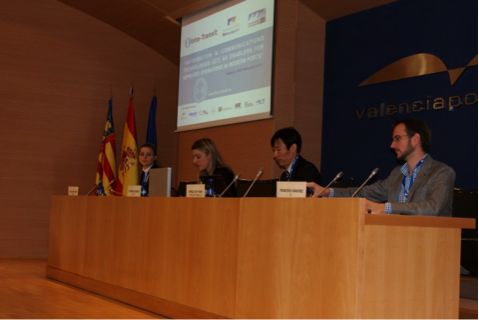
The Valenciaport Foundation hosted the 1st international Workshop of the INTE-TRANSIT project under the theme: “Information & Communications Technologies (ICTs) as enablers for improved operations in modern ports”. The principal objective of the event was to explain the role of information and communication technologies (ICTs) in rendering ports more competitive and efficient. The event was co-organised by VPF, SEAbility and ICCS in 20-21 November 2014.
The conference was inaugurated by Ramón Gómez-Ferrer, the director of the Port Authority of Valencia (APV), who explained how the INTE-TRANSIT initiative serves as a good example of the firm commitment of the APV to the continuous improvement of the role of ports in the transport chain. In addition, Fernando Liesa, the head of CNCLogística, who also chaired the opening session, presented the ALICE European logistics technological platform and explained how ALICE shares a global vision of logistics and the supply chain in which manufacturers, shippers, freight forwarders, distributors and logistics operators collaborate to develop innovative management models. Opening speeches were also performed by Vicente del Río, the director of the Valenciaport Foundation, Gustavo Ferrer, the director of Noatum Container Terminal Valencia, Athanasia Tsertou (ICCS), Blanca López (MED officer) and Fernando Fernández Melle, the deputy general director of the European Cohesion Fund and Territorial Cooperation and Urban Development of the Spanish Ministry of Finances and Public Administration.
During the 1st technical session the current need to trace and monitor containers in maritime transport were also presented from three different points of view: Ignacio Huet, the head of ICT of Noatum, presented the terminal containers view; Sherrie Orzechowski from INTTRA, an e-commerce leading software developer, presented the advances and services offered in terms of monitoring containers by maritime transport companies and finally José García, the head of ICT of the APV, presented the vision and needs of the port community and how the Valenciaportpcs.net platform responds to them.
During the 2nd session, the vision of the MED ports as well as the operational challenges that they face focusing specifically on Valencia, Koper and Algeciras ports where also presented to the attendees.
The afternoon the 3rd technical session took place during which various companies of the ICT sector presented the latest advances and tools developed to improve traceability and operations in the port domain. This included the automation of port and terminal processes and RFID technology applied to the logistics of vehicles.
The conference continued the next day with a round table where representatives from the three principal container terminals of the Port of Valencia (Noatum, MSC Terminal and TCV), the terminal of Piraeus (Greece) and the Italian terminal CONATECO participated and analysed the various ICT tools used in logistics, such as the Terminal Operating System, ‘business intelligence’ tools and automation and monitoring systems, among others.
The 5th and final technical session was dedicated to the progress being made in various European projects of the MED programme: Futuremed, MED-PCS, MEDITA, Smart-Port and Optimizemed. The presentations took place during this Workshop are available for download through this link.
